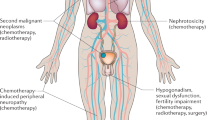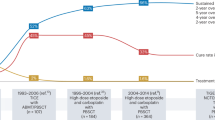Abstract
Twenty-seven patients cured of advanced testicular cancer by cisplatin-based chemotherapy have been assessed, a median of 30 months after start of treatment, for the long-term effects of such treatment on renal, endocrine, audiometric, reproductive and respiratory function. To control for the effects of orchidectomy on endocrine function a similar group of 11 patients cured by orchidectomy alone was also assessed. The extents of impairment in hearing and renal function were related to the total dose of cisplatin received, while the majority of patients had respiratory impairment which was, in part, related to the total dose of bleomycin. TSH was significantly higher in the chemotherapy group although serum free thyroxine and free T3 were normal in all. FSH was raised in 67% of the chemotherapy group although serum free thyroxine and free T3 were while LH was raised in 75% and 45% respectively. Serum testosterone was normal in all. The levels of FSH and LH were both independently correlated with age of the patient while FSH was higher in patients having more chemotherapy and had a tendency to fall towards normal with time since treatment. Over half the patients had normal sperm concentrations although 74% had a raised proportion of abnormal sperm. Indices of sperm function were worse in patients having more chemotherapy but sperm number increased towards normal with time since treatment, particularly after the second year. The long-term side-effects of chemotherapy for testicular cancer are thus generally mild but are largely irreversible and their severity is related to the total amount of chemotherapy received. As their longer term significance is not clear we would recommend that, in the treatment of testicular cancer, doses of chemotherapy are reduced to the minimum required for cure. Assessment of long-term side-effects of chemotherapy for testicular cancer should be a mandatory part of any study of such treatment and should be considered in any comparison of different therapies.
This is a preview of subscription content, access via your institution
Access options
Subscribe to this journal
Receive 24 print issues and online access
$259.00 per year
only $10.79 per issue
Buy this article
- Purchase on Springer Link
- Instant access to full article PDF
Prices may be subject to local taxes which are calculated during checkout
Similar content being viewed by others
Author information
Authors and Affiliations
Rights and permissions
About this article
Cite this article
Stuart, N., Woodroffe, C., Grundy, R. et al. Long-term toxicity of chemotherapy for testicular cancer – the cost of cure. Br J Cancer 61, 479–484 (1990). https://doi.org/10.1038/bjc.1990.106
Issue Date:
DOI: https://doi.org/10.1038/bjc.1990.106
This article is cited by
-
Exploring the spectrum of late effects following radical orchidectomy for stage I testicular seminoma: a systematic review of the literature
Supportive Care in Cancer (2019)
-
Dynamics of hormonal disorders following unilateral orchiectomy for a testicular tumor
Medical Oncology (2017)
-
Clinical significance of androgen secretion disorders in men with a malignancy
Medical Oncology (2017)
-
Early manifestation of mild cognitive impairment in B-cell non-Hodgkin’s lymphoma patients receiving CHOP and rituximab-CHOP chemotherapy
Naunyn-Schmiedeberg's Archives of Pharmacology (2016)
-
Hypogonadism in male cancer patients
Journal of Cachexia, Sarcopenia and Muscle (2012)



